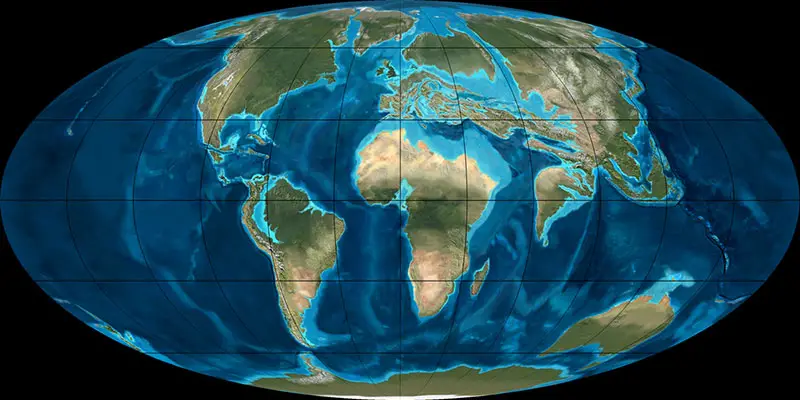†Ourayia (Omomyidae)
Ourayia ist eine Primatengattung innerhalb der Familie Omomyidae, deren 3 Mitglieder ab dem frühen Paläogen (Eozän) im Lutetium lebten, das vor ungefähr 47,8 Millionen Jahren begann und bis vor 41,3 Millionen Jahren andauerte. Viele Überreste wurden in Vereinigte Staaten von Amerika (USA) gefunden.
Ourayia ist der Gattungsname zweier ausgestorbener Primatenarten aus der Familie Omomyidae (Tribus Ourayiini innerhalb der Unterfamilie Omomyinae), die im Eozän in Nordamerika verbreitet waren.
Ihre Überreste stammen aus Utah, Wyoming und Texas und sind zwischen 46,2 und 42,0 Millionen Jahre alt.
Ourayia hopsoni
Das Typusexemplar trägt die Nummer YPM 15266 und ist ein rechtes Unterkieferfragment mit Prämolaren und Molaren (P4-M2). Der Fund stammt aus dem Lower Myton Member der Uinta Formation (Duchesne County, Utah) und ist zwischen 46,2 und 42,0 Millionen Jahre alt.
| Sammlung | Kommentar zum Fundort | Epoche, Alter | Geologie, Formation |
|---|---|---|---|
| Badwater Locality 5A | Wagon Bed ("Tepee Trail") | ||
| Physiologie | |
|---|---|
| Gewicht: | ? |
| Schwestertaxa | |
Ourayia uintensis
Das Typusexemplar mit der Bezeichnung A.M.N.H. No. 1899 ist ein Unterkiefer mit zwei Prämolaren und zwei Molaren. Der Fund stammt aus dem Upper Wagonhound Member der Uinta Formation (Uintah County, Utah) und ist zwischen 46,2 und 42,0 Millionen Jahre alt.
| Sammlung | Epoche, Alter | Geologie, Formation | Kommentar zur Sammlung |
|---|---|---|---|
| Junction (TMM 41443) | Devil's Graveyard | DUPLICATE REF 3667 or 3852 | |
| Museum | Kommentar z. Taxonomie | ||
| TMM | this is Junction sensu stricto underlies Whistler Squat said by Prothero 1996b to be Bridgerian; Figure 2 of Wilson indicates that it is roughly at the level of the Alamo Creek Basalt because both are above the "basal Tertiary conglomerate" and below the "variegated bentonites"; the ACB is dated at 46 Ma (KA), and a tuff just below it at 46.0 +/- 1.0 Ma (KA) and 46.29 +/- 0.05 Ma (AA); latter date seems best the following taxa are from Junction, exact locality unknown: Scenopagus priscus Centetodon pulcher ? Entomolestes sp. Nyctitherium velox cf. Pantolestes sp. |
Literatur
P. Robinson 1968, The paleontology and geology of the Badwater Creek area, central Wyoming. Annals of Carnegie Museum. 39:19, p. 307 - 326L. Krishtalka 1978, Paleontology and geology of the Badwater Creek area, central Wyoming\r\nPart 15. Review of the late Eocene primates from Wyoming and Utah,\r\nand the Plesitarsiiformes. Annals of Carnegie Museum. 47:15, p. 335 - 360
R. M. West 1982, Fossil Mammals from the Lower Buck Hill Group, Eocene of Trans-Pecos Texas: Marsupicarnivora, Primates, Taeniodonta, Condylarthra, Bunodont Artiodactyla, and Dinocerata. Pearce-Sellards Series. 35:15, p. 1 - 20
D. R. Prothero 1996, Magnetic stratigraphy and biostratigraphy of the middle Eocene Uinta Formation, Uinta Basin, Utah. The Terrestrial Eocene-Oligocene Transition in North America. :15, p. 3 - 24
S. M. McCarroll, J. J. Flynn, W. D. Turnbull 1996, Biostratigraphy and magnetostratigraphy of the Bridgerian-Uintan Washakie Formation, Washakie Basin, Wyoming. The Terrestrial Eocene-Oligocene Transition in North America. :15, p. 25 - 39, DOI: 10.1017/CBO9780511665431.003
D. R. Prothero, J. J. Flynn, W. D. Turnbull 1996, Magnetic stratigraphy and biostratigraphy of the middle Eocene Uinta Formation, Uinta Basin, Utah. The Terrestrial Eocene-Oligocene Transition in North America. :15, p. 3 - 24, DOI: 10.1017/CBO9780511665431.003
J. Alroy, J. J. Flynn, W. D. Turnbull 2002, Synonymies and reidentifications of North American fossil mammals. . :15, p. - 24, DOI: 10.1017/CBO9780511665431.003
B. A. Williams, E. C. Kirk, W. D. Turnbull 2008, New Uintan primates from Texas and their implications for North American patterns of species richness during the Eocene. Journal of Human Evolution. 55:6, p. 927 - 941, DOI: 10.1017/CBO9780511665431.003
C. J. Campisano, E. C. Kirk, K. E. B. Townsend, A. L. Deino 2014, Geochronological and Taxonomic Revisions of the Middle Eocene Whistler Squat Quarry (Devil’s Graveyard Formation, Texas) and Implications for the Early Uintan in Trans-Pecos Texas. PLoS ONE. 9:7, p. e101516 - 941, DOI: 10.1371/journal.pone.0101516
B. Adrian, H. F. Smith, J. H. Hutchison, K. E. B. Townsend 2021, Geometric morphometrics and anatomical network analyses reveal ecospace partitioning among geoemydid turtles from the Uinta Formation, Utah. The Anatomical Record. :7, p. 1 - 35, DOI: 10.1002/ar.24792
